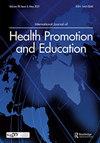Effectiveness of self-management health promotion education package among diabetic patients in Pokhara Metropolitan City, Nepal
IF 0.7
Q3 EDUCATION, SCIENTIFIC DISCIPLINES
International Journal of Health Promotion and Education
Pub Date : 2022-02-17
DOI:10.1080/14635240.2022.2034030
引用次数: 0
Abstract
ABSTRACT Diabetes is on an increasing trend, and it is one of the four priority non-communicable diseases (NCDs) and major public health problems. Studies indicate that educational programs are effective in the management of diabetes. The objective of this study was to determine the effectiveness of a diabetes self-management education program among diabetic patients in Pokhara Metropolitan City, Nepal. The study design was a pre-test and post-test interventional study among 60 diabetic patients. Questionnaires were used to collect information about demographic variables and Health Belief Model (HBM) constructs. Data were collected before the educational intervention program and after the educational intervention program. Paired t-test was performed to assess the effectiveness of an educational intervention. This study showed the effectiveness of the self-management health promotion educational package. The results showed a significant increase in each construct of HBM and self-management practice after the educational intervention (p < 0.0001). The mean value of perceived susceptibility was increased from 2.94 to 3.49; perceived severity was increased from 2.83 to 3.08; the perceived benefit was increased from 3.09 to 3.55; the perceived barrier was decreased from 2.44 to 2.00, self-efficacy was increased from 3.06 to 3.48 and self-management practice was increased from 3.02 to 3.46. The intervention was effective to the diabetes patients; there was an increase in perceived susceptibility, perceived severity, perceived benefit, self-efficacy, and self-management practice except for the perceived barrier. Educational programs should be focusing on the behavioral theory that plays a significant role in the self-efficacy and control of diabetes.尼泊尔博卡拉市糖尿病患者自我管理健康促进教育包的有效性
糖尿病呈上升趋势,是全球四大重点非传染性疾病(ncd)之一,也是主要的公共卫生问题。研究表明,教育计划是有效的管理糖尿病。本研究的目的是确定糖尿病自我管理教育计划在尼泊尔博卡拉市糖尿病患者中的有效性。研究设计为对60例糖尿病患者进行测试前和测试后的介入研究。使用问卷收集人口统计变量和健康信念模型(HBM)结构的信息。数据收集于教育干预计划实施前和实施后。采用配对t检验评估教育干预的有效性。本研究显示自我管理健康促进教育套装的有效性。结果显示,教育干预后,各构式HBM和自我管理实践均显著增加(p < 0.0001)。感知易感性均值由2.94上升至3.49;感知严重性从2.83增加到3.08;感知效益由3.09提高到3.55;感知障碍从2.44降低到2.00,自我效能感从3.06提高到3.48,自我管理实践从3.02提高到3.46。干预对糖尿病患者有效;除感知障碍外,感知易感性、感知严重性、感知利益、自我效能和自我管理实践均有所增加。教育项目应该关注在自我效能和糖尿病控制中起重要作用的行为理论。
本文章由计算机程序翻译,如有差异,请以英文原文为准。
求助全文
约1分钟内获得全文
求助全文
来源期刊

International Journal of Health Promotion and Education
EDUCATION, SCIENTIFIC DISCIPLINES-
CiteScore
2.30
自引率
10.00%
发文量
69
 求助内容:
求助内容: 应助结果提醒方式:
应助结果提醒方式:


